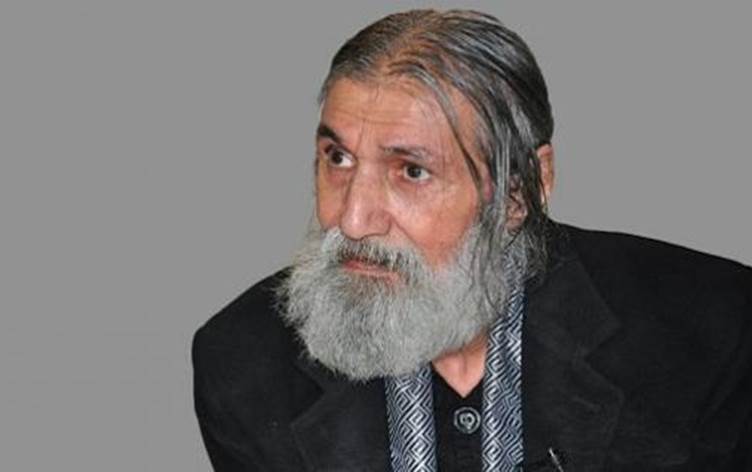ERBIL, Kurdistan Region - Famous Kurdish singer Abbasi Kamandi passed away Thursday of heart failure, the day after he was hospitalized for kidney complaints. He was 62.
A native of the Kurdish city of Sanandaj (Sina) in Iranian Kurdistan, Kamandi was one of the most popular singers in the Kurdish world. His voice crossed borders and touched young and old alike. He died as he had wished: At his birthplace.
Kamandi, who worked for more than three decades at Radio Sina, was also a talented playwright who penned numerous television and radio plays. In later years he took to painting, and in 2012 showed his art at an exhibition in Sulaimani city, the cultural capital of the Kurdistan Region.
“Some people ask me, ‘why don’t you just stick to music, or painting, or poetry, or carving, or writing?’” Kamandi said at a press conference during a recent visit to the Kurdistan Region. “But what can I do when it is all burning within me? I’m not looking for them, they look for me.”
Kamandi got his first writing award for best story in 1970, when he was only 18, at a contest organized by Radio Sina, where he went on to work for a quarter century. He also headed the House of Culture and Literature.
Kamandi’s traditional songs were and still are the theme music of countless documentaries and TV shows. In spring, as Kurdish families dot the mountainsides on picnic, Kamandi’s music rings through the valleys and blasts out of cars.
In the early 1990s and just as Kurds in Iraq had gained autonomy and were busy rebuilding their villages, Kamandi’s most famous song Kalabay or “Unripe Quince” was the theme of the most popular TV program on the revival of village life.
The love for simple village life, spring and flowers were the main features of his music.
“We are born with love,” he said to a crowd of journalists, artists, poets and many of his fans in Sulaimani. “A person in love is the luckiest person. Love comes with a lot of headache, but it also gives pleasure. It makes you creative.”
In many interviews, Kamandi said that he always wanted to be known as a poet, but he was known till the end as a singer.
Seldom does a day go by without his songs being played on one radio station or another.
In an interview with the Kurdish magazine Raman two years ago, Kamandi said modestly: “If I die today, at least I would take with me three original songs to my name. Songs that I cannot compose and tell someone else, ‘you sing them’.”
In a condolence statement on Thursday Kurdistan Parliament Speaker Yousif Muhammad said that, “The death of master Kamandi is a great loss to Kurdish art and music. From the start and for more than half a century, Kamandi served Kurdish culture with his originality.”
One of Kamandi’s earliest and most famous songs, “Sabri Gyan.” was a duet with the doe-eyed Kurdish singer Shahen Talabani, which flared up more than two decades of rumors that the two were in love.
“For the past 20 years I have been saying that there is no affair between me and Shahen,” said Kamandi during his last visit to Sulaimani.
“I have never been in love with Shahen, but people keep saying that we have a love affair. What can I do? People want to create heroes; they want to create another Majnoon (Romeo).”
Kamandi, who was for years the voice of the Kamkars Band, warned that traditional Kurdish music is under threat from Arabic and Turkish songs.
“Many of us today imitate the Turkish and Arab singers,” he said. “Many Kurdish singers just apply Kurdish lyrics to Arabic or Turkish songs, and then we call this Kurdish music. If we continue on this path, Kurdish music will collapse.”
Months before his death, sitting in front of his paintings in Sulaimani, Kamandi lamented that today’s young singers do not understand the meaning of traditional music.
He said that musicians who have returned from abroad with advanced degrees have failed to contribute to Kurdish folk music.
“They cannot apply what they have learned to advance Kurdish music.”
“Sometimes when you listen to our singers you cannot tell if their music is Kurdish, Arabic, or Turkish until they start singing the words.”
Kamandi recorded more than 60 songs since beginning his singing career, wrote lyrics for 150 songs, authored several books of poetry and researched the lives of historical Kurdish figures. He said he could not release new albums in later years due to high production costs.
Kamandi who did not have a college education, lived his entire life in his birthplace.



Comments
Rudaw moderates all comments submitted on our website. We welcome comments which are relevant to the article and encourage further discussion about the issues that matter to you. We also welcome constructive criticism about Rudaw.
To be approved for publication, however, your comments must meet our community guidelines.
We will not tolerate the following: profanity, threats, personal attacks, vulgarity, abuse (such as sexism, racism, homophobia or xenophobia), or commercial or personal promotion.
Comments that do not meet our guidelines will be rejected. Comments are not edited – they are either approved or rejected.
Post a comment